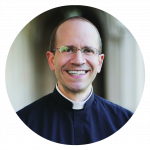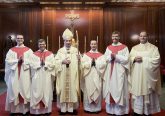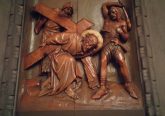Papal Infallibility
![]()
What does it mean to say the pope is infallible? Can any human truly be infallible?
The doctrine of papal infallibility is rooted in the belief that the pope, as the Bishop of Rome and the spiritual leader of the Catholic Church, has been given a unique role by Jesus Christ to teach and guide the Church on matters of faith and morals. This doctrine, which is widely misunderstood, is specific and limited in its application—so much so that very few papal statements have been expressly invoked as infallible.
AUTHORITY
The pope is the visible head of the Church on earth and has been given the authority by Christ to govern the Church and make definitive and binding decisions. This is not from any special merit of his own but by virtue of his teaching office.
The Holy Spirit, who continues to guide the Church, is the source of this authority and assures that the pope will correctly teach when annunciating such teachings. The understanding of this authority is linked with papal primacy, as given to St. Peter by Jesus (Mt. 16: 18 – “You are Peter, and upon this rock I will build my church…”).
When annunciated as such, infallible teachings require the faithful to assent. They are binding on all Catholics and considered a part of the Church’s Magisterium (teaching authority) and are revealed to have been part of the deposit of faith—such as the articles of the Creed.
THE DEBATE
In the mid-19th century, the pope faced challenges to his temporal power while Enlightenment philosophies challenged the intellectual credibility of Catholic dogma. With the Papal States’ seizure, the pope sought to reassert his spiritual and teaching role. Although not a new concept, papal infallibility had not been fully articulated.
The doctrine of papal infallibility was formally defined at the First Vatican Council (1869-1870), although its approval for declaration was contentious, mostly because bishops from countries with non-Catholic majorities believed it would be misunderstood. These bishops—collectively known as the “inopportunists”—did not reject the teaching, but they questioned its timing. Ultimately, all but two bishops at the council voted in favor of infallibility (with the two dissenting bishops offering their assent later).
LIMITATIONS
Papal infallibility is separate from the pope’s everyday teaching and decision-making. It also does not apply to his moral conduct or suggest holiness or sinlessness. Ordinarily, what the pope says or does is not considered infallible; infallibility applies only when the pope speaks ex cathedra, which means “from the chair” (in an official capacity).
The pope must expressly state that he is teaching this way for his statement to be considered infallible. Ex cathedra statements are rare. The most recent example is Pope Pius XII’s definition of the Assumption of Mary as a dogma in 1950.
THE SPIRIT’S GUIDANCE
The Second Vatican Council taught that infallibility should be understood in light of the Holy Spirit’s guidance of the Church. The pope, as the supreme shepherd and teacher of all the faithful, may, by a definitive act, confirm his brethren in their faith “by a doctrine of faith or morals.” Such definitions are infallible “not from the consent of the Church” but because they are “pronounced with the assistance of the Holy Spirit” (Lumen Gentium, 25.)
Infallibility is rarely invoked, and its application is narrow. It is intended, not to confuse, but to provide clarity and assurance regarding faith and morals, while allowing for development and growth in the Church’s understanding of divine revelation over time.
 Father David Endres is professor of Church history and historical theology at Mount St. Mary’s Seminary & School of Theology
Father David Endres is professor of Church history and historical theology at Mount St. Mary’s Seminary & School of Theology
This article appeared in the February 2024 edition of The Catholic Telegraph Magazine. For your complimentary subscription, click here.













